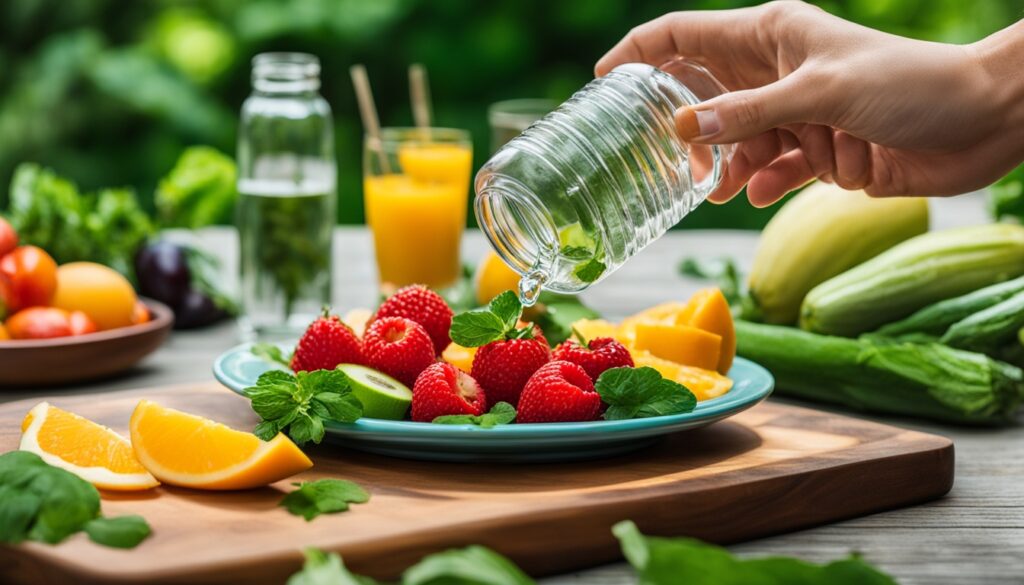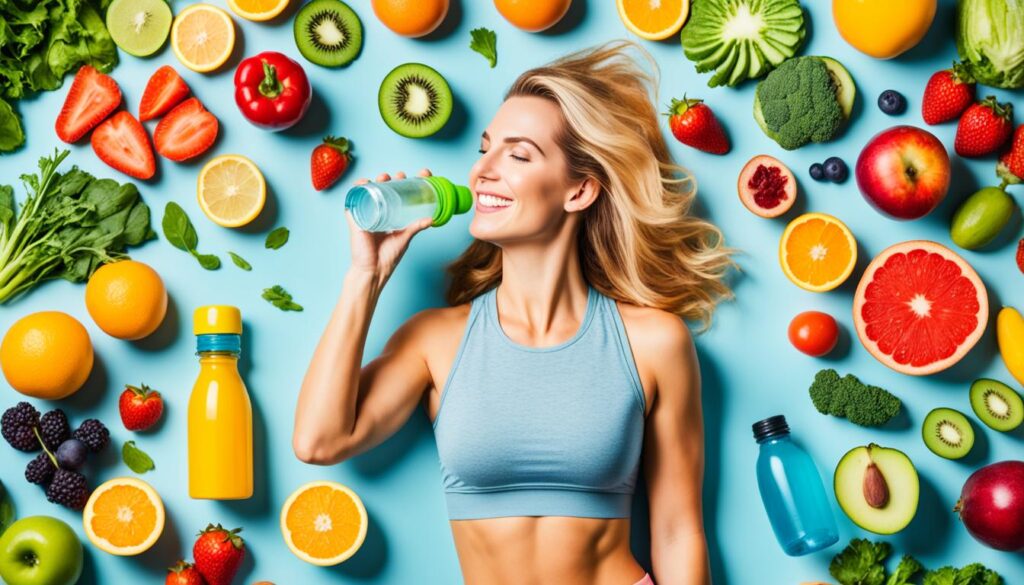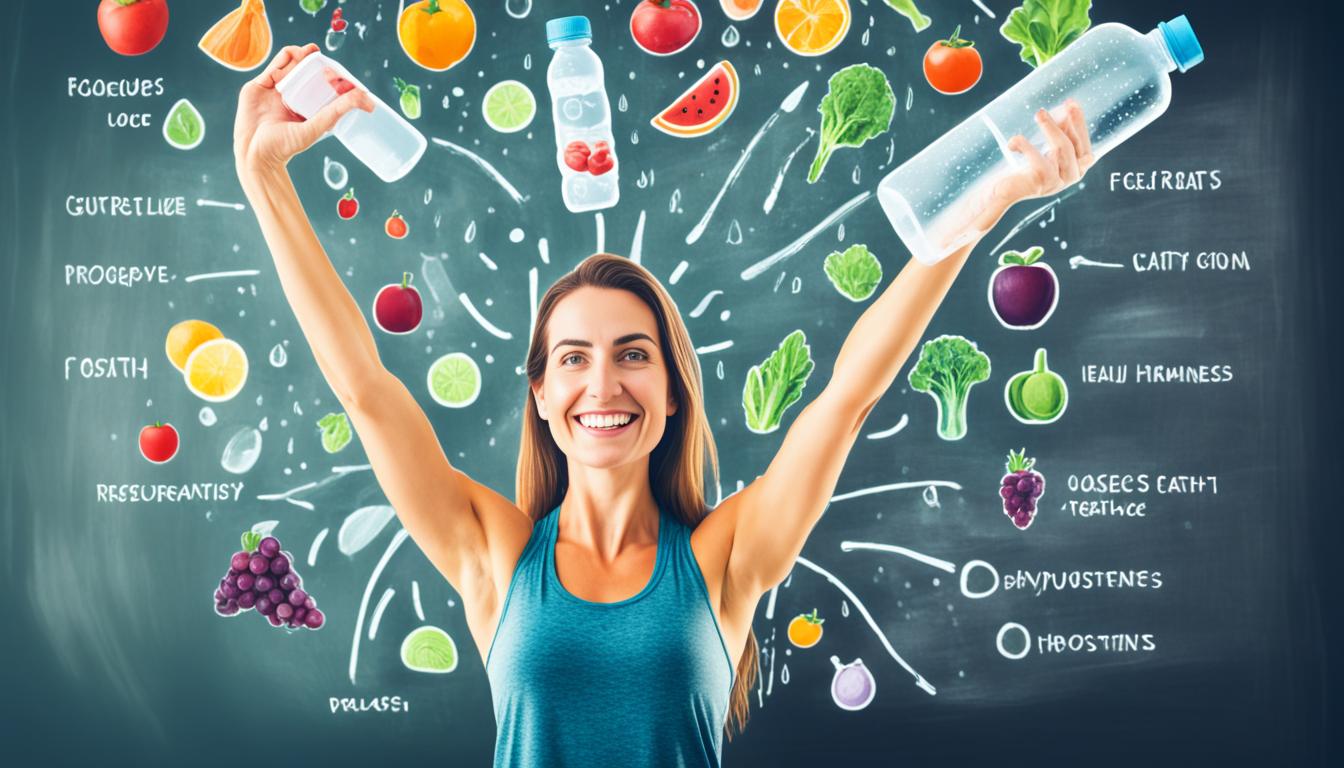In today’s world, being aware of water in diet plans is key. Proper hydration is vital for a water diet. It supports many functions in our bodies, helping with weight control. Knowing the right amount of water to drink is more than just drinking a lot. It’s about planning carefully. This includes the role of water-rich foods, building good habits, and staying safe.
To start a water diet, it’s important to set realistic goals for how much to hydrate. Studies show using apps like MyFitnessPal can boost your efforts to lose weight compared to not tracking1. Drinking water before eating can help shed about 5 extra pounds1. This simple step becomes part of your daily routine. It helps remind you to drink enough and aids weight loss.
How much water is right for you depends on your weight and how active you are. Someone at 150 pounds should drink 75 ounces a day1. Athletes might need more, up to 1.5-2.5 cups extra, to stay hydrated during hard workouts1. This keeps them performing their best.
It’s crucial to tell the difference between being thirsty and really hungry. People often eat too much when they’re actually just thirsty1. A well-planned water diet helps you stay hydrated and teaches better eating habits. It can cut down on random hunger and improve how your body digests food. Drinking water after meals is good for digestion and helps prevent constipation1. Also, bottled water is very popular now, even more than drinks like coffee and juice1.
Key Takeaways
- Drinking water before meals can help you lose about 5 pounds more than those who don’t1.
- A 150-pound person should aim for 75 ounces of water daily1.
- Apps like MyFitnessPal can enhance weight loss by tracking food and exercise1.
- Athletes need an additional 1.5-2.5 cups of water beyond regular intake1.
- Recognizing thirst vs. hunger is crucial for avoiding overeating1.
Understanding the Basics of Hydration and Its Importance
Staying hydrated is key to keeping our bodies working well. Water helps in many ways, like with digestion and keeping us cool. It also helps our brains work better. Drinking enough water can make our skin look healthier and even help with losing weight.
Why Hydration Matters
Being hydrated means our body works at top speed. Our bodies are mostly water, needed for getting rid of waste and keeping our temperature steady. Good water habits stop problems like kids having trouble thinking2 and older folks facing serious health issues3.
How Much Water Should You Drink Daily?
The right amount of water can change, based on how much you weigh, what you do, and where you live. Generally, men should drink about 13 cups a day, and women 9 cups4. If you’re pregnant or nursing, up it to 10 or 12 cups each day4. Even with these rules, many Americans don’t drink enough water3.
Signs and Symptoms of Dehydration
It’s important to spot dehydration early. This isn’t just feeling parched but also includes dizziness and being tired. Notice dark pee or feel less sharp? You might need more water2. Dehydration hits 1 in 5 seniors and can be very serious3. Make sure to drink water often and listen to your body.
Creating a Water Diet Plan: Tips and Guidelines
To make a good water diet plan, think about what you’re aiming for. Look at your daily life and the water you drink. This careful approach can help a lot with staying healthy and losing weight.
Setting Hydration Goals
Starting with clear goals for how much water you want to drink is key. For most people, it’s best to drink 2-3 liters daily, even when not eating. This amount keeps you hydrated and has health benefits, like helping your body use insulin better and cutting down on fat5. When dieting, your water needs depend on things like how active you are, the weather, and your health. Keep track of your water and adjust as needed to meet your goals.

Incorporating Hydration Into Your Daily Routine
Fitting in more water each day can be simple. Try taking water breaks, carrying a reusable bottle, or using apps to remind you to drink. If you’re into fasting for health reasons, drinking enough water can improve focus and clear your mind6. The key is to find ways that fit your life without adding too much stress. This way, you can keep up with your diet water goals every day.
Choosing the Right Type of Water
It’s important to pick the right water to get necessary minerals and to stay healthy. You might choose mineralized or filtered water to get extra nutrients without the bad stuff. When fasting, good quality water can help cut inflammation and boost heart health by keeping your blood pressure and cholesterol in check5. By choosing wisely, your water diet will be more successful, leading to better health.
Healthy Hydration Habits for Weight Loss
Adding good water habits to your weight loss plan carries many benefits. It’s not just about ending thirst. Knowing how water is tied to losing weight offers a simple, strong method for hitting your weight goals.
The Role of Water in Weight Management
Water is key in managing your weight. It helps with digestion, getting rid of wastes, and keeps your body working well. By staying hydrated, your body burns calories better and you can keep track of how much you eat. In a study, those drinking 6.8-8.5 ounces of warm water after a meal lost more weight. They also had a lower BMI7. However, the 8-by-8 rule, which says you should drink 64 ounces of water each day, isn’t fully backed by science8. But, keeping up with water helps with workouts and improves your health overall.
How Water Can Help You Eat Less
Having water can make you feel less hungry. For example, in one study, from 2015 to 2016, about a quarter of the participants said they were drinking more water to lose weight7. Just one extra cup of water a day can slow down weight gain by 0.13 kg (0.23 lb)7. This habit stops you from eating too much and cuts down on how many calories you take in. It’s smart to drink water before eating; it helps stop you from eating too much.
Replacing High-Calorie Drinks with Water
A simple way to lose weight is to swap high-calorie drinks for water. In a study, people who changed a sugary drink for water cut down 0.5 kg (1.1 lb) of weight worth of gain in 4 years7. Another study showed that picking water over drinks with lots of calories helped in losing weight, from 0.4-8.8 kg. On average, they lost 5% of their weight7. This change is good not only because it removes extra sugar but also makes sure you stay well-hydrated for weight loss.

Staying Hydrated with Water-rich Foods
Adding water-rich foods to your diet doesn’t just boost hydration. It also brings new flavors and textures to your food. Usually, these foods are fruits and veggies with lots of water, making them great for staying hydrated. With these in your meals, you’ll enjoy tasty and healthy options that help you meet your hydration needs.
Fruits and Vegetables with High Water Content
Fruits and vegetables are key when it comes to staying hydrated. Take cucumbers, for example. They’re 95% water, have just 8 calories, and are rich in fiber, vitamin K, and vitamin A9. Tomatoes, on the other hand, hold 170.14 g of water per sliced cup, making them a great addition to salads9. Watermelon and peaches are also top picks, with watermelon at 92% water and peaches at 88% water. They provide hydration plus important nutrients9.
Watercress is praised by the Centers for Disease Control and Prevention for being super nutritious and hydrating9. It’s a “powerhouse fruit and vegetable.” Apples are great too, containing 85.56 g of water per 100-gram serving. They’re a perfect, hydrating snack choice9.
Delicious Hydrating Recipes
Making hydrating recipes is enjoyable and offers many benefits. Foods like celery, with 115 g of water per cup, and lettuce, which is over 95% water, help create salads that refresh and quench your thirst. These salads also boost bone strength, vision, and sleep9.
For an easy way to get more water in your diet, try smoothies. Start with ingredients like zucchini, which has 95% water and 1 g of fiber, and add other fruits and veggies. Blend for a tasty, nutrient-filled drink9. For more ideas on water-rich foods, check out this list.
Broths and Soups for Extra Hydration
In colder weather, broths and soups are not just warm and cozy. They’re also a great way to get more water. With water-rich veggies in your soup, like zucchini and tomatoes, you’ll boost hydration and enjoy the taste9. These recipes are perfect for staying warm, cozy, and hydrated.
Tips to Improve Your Daily Water Intake
Increasing your water intake every day doesn’t have to be hard. You can use new ways to make it easier and fun. Try technology, tasty infusions, and easy-to-carry options.
Using Technology to Track Water Intake
Technology can help you watch how much water you drink. There are apps and smart water bottles that remind you to sip all day. Having a water bottle with you makes it easier to drink. It’s a clear signal to keep hydrated. Plus, using these tech tools can help you reach your hydration targets.
Infusing Water for Flavor
If you don’t like plain water, add fruits, herbs, or veggies for taste. It not only makes water fun but also boosts its nutrients. Foods with lots of water, like lettuce, celery, and zucchini, help keep you hydrated too10.
Portable Water Solutions for On-the-go Hydration
Being on-the-go can make drinking water tough. But with insulated bottles, you’re always ready for a sip of water. Remember, men should aim for 125 ounces daily, while women need about 90 ounces to stay hydrated10.
Here’s a table to help you use these water diet tips in your daily life:
| Method | Benefit | Usage |
|---|---|---|
| Technology | Tracks and reminds daily intake | Apps and smart bottles |
| Flavor Infusion | Enhances taste without sugars | Fruits, herbs, vegetables |
| Portable Solutions | Keeps water cold on-the-go | Insulated bottles |
These water diet tips can help you reach your daily water goals with ease and joy.
Safety Considerations for Water Fasting
Water fasting means not eating any food and only drinking water for a period. These fasts are usually between 24 to 72 hours long. Some people fast longer but they need a doctor’s care11. People fast to lose weight, get rid of toxins, and lower their blood pressure. Medically supervised fasts have proven to drop blood pressure in people with borderline high blood pressure11. Fasting also might help the body use insulin better, which can lower the chance of getting diabetes11.
Fasting is not without risks. Going beyond three days without food should only be done under a doctor’s watch1112. In a study, 1422 people fasted for 4 to 21 days and saw health gains. But, some risks were found too13. These risks can include stomach problems, nutrient shortages, and changes in blood pressure. There might also be issues with too much or too little sodium in the blood. Other risks are lower energy, focus problems, and the temptation to overeat after a fast11.
Fasting can make you dizzy, especially if you stand up quickly after not eating for 2-3 days12. It clears out old cells from the brain, a process called neuronal autophagy13. Keep away from heavy workouts when you’re not eating to avoid stress on the body12. After fasting, start eating gently with foods that are easy on your stomach. Slowly work back to regular eating to prevent stomach problems12.
Always talk to a doctor before fasting, even if it’s just with water. They can check if fasting is safe for you. Drink water in small amounts through the day to stay hydrated but not overdo it12. Eating balanced meals after a fast is key to keeping the benefits of the water diet. It also looks after your overall health.
Leveraging Liquid for Lifestyle Enhancement
Drinking enough water doesn’t just help with losing weight and staying healthy. It does a lot more. It can make you sleep better and handle stress. This makes you feel better both mentally and physically. The 2020–2025 Dietary Guidelines for Americans say eating a good mix of healthy fats is key for health14.
Drinking lots of water is great for your digestion and for doing better in your day-to-day activities. The goal is to drink between 100 and 128 ounces of water daily. This keeps you hydrated and can lower your urge to eat, a big part of a good diet. Also, the CDC recommends 150 minutes of exercise a week to help keep your body and mind healthy15.
Switching to a water-based diet can kick off a lot of positive changes in your life. It helps you control your calorie intake and ensures you get key nutrients. For example, drinking water instead of sugary drinks can make a big difference. Trying time-restricted eating for 60 days can improve how your body burns fat16. These steps together can really boost your quality of life and health over time.
Source Links
- How to Do a Water Diet: 12 Steps (with Pictures) – wikiHow
- Water, Hydration and Health
- Water, Hydration, and Health | Nutrition.gov
- How Much Water Should I Drink?
- The Complete Water Fasting Guide – Safely Unlock Health Benefits?
- Mya Care
- How Drinking More Water Can Help You Lose Weight
- Drinking Water to Lose Weight: How Much Water Helps?
- Foods High in Water
- 12 Simple Ways to Drink More Water
- Should You Try Water Fasting?
- Perform a Water Fast: Safe Guidelines for Beginners
- Is Water-Only Fasting Safe?
- 11 Healthy Lifestyle Tips that Will Change Your Life
- The No BS Guide to Lean and Mean Eating
- Intermittent Fasting for Enhanced Health: Huberman Protocol




